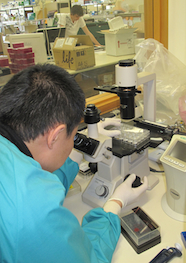Identifying the best treatment

Dr Augustine Chen assessing cell growth.
Every cancer is different. Personalised medicine means that a patient gets the best treatment for their particular needs, based on their genome, the genetic changes that have occurred in the tumour, and the stage of their tumour.
Personalised medicines mean that we can:
- Select the best chemotherapy for an individual patient
- Help predict a patient's progress
- Indicate the likelihood of a patient having severe side effects from a treatment
The more we understand about how tumours evolve, and what properties they use to regenerate, the better placed we are to target them.
Related topics
- Biomarkers in ovarian and breast cancers
- Bowel cancer: Predicting capecitabine response
- Breast cancer: Novel genes involved in susceptibility and response
- Circulating tumour DNA (ctDNA) - a liquid biopsy
- Role of alternative isoforms of p53 in cancers and inflammation
- Short circuit to thrombosis: Tumour vesicles in coagulation
- Telomere maintenance in cancer
- Epigenetic chemoprevention of gastric cancer
- YB-1 in tumour progression and drug resistance
Research personnel
- Professor Mik Black
- Professor Antony Braithwaite
- Associate Professor Aniruddha Chatterjee
- Dr Augustine Chen
- Dr Kanueng (Kenny) Chitcholtan
- Associate Professor Heather Cunliffe
- Dr Robert Day
- Associate Professor Anita Dunbier
- Professor Mike Eccles
- Dr Nicholas Fleming
- Dr Khaled Greish
- Professor Parry Guilford
- Jody Hazlett
- Dr Chris Jackson
- Dr Lynnette Jones
- Professor Martin Kennedy
- Dr Peter Mace
- Professor John McCall
- Professor Bridget Robinson
- Dr Mak Sarwar
- Professor Katrina Sharples
- Professor Logan Walker
- Michelle Wilson
- Dr Adele Woolley